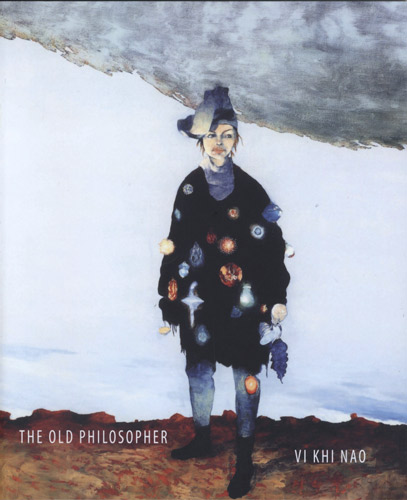The Old Philosopher
Vi Khi Nao, born in Long Khanh, Vietnam in 1979, came to the United States when she was seven years old. In her book, The Old Philosopher, she has given us poems in vigorous experimental language. Reading through the book the first time, there is a feeling of a balanced worldly eye, even as the pervasive indistinctness of mixed and matched images/metaphors leaves a sense of no orientation. By the third reading, the seemingly unmoored fragments begin to come into focus: the book feels like the interlacing of two cultures initiated by the wreckage of the Vietnam War.
Vi Khi Nao, born in Long Khanh, Vietnam in 1979, came to the United States when she was seven years old. In her book, The Old Philosopher, she has given us poems in vigorous experimental language. Reading through the book the first time, there is a feeling of a balanced worldly eye, even as the pervasive indistinctness of mixed and matched images/metaphors leaves a sense of no orientation. By the third reading, the seemingly unmoored fragments begin to come into focus: the book feels like the interlacing of two cultures initiated by the wreckage of the Vietnam War.
The poet uses folkloric-like elements of conversational rhythm and hyperbolic content, even as surface meaning is felicitously gutted. Nao is the mistress of the history she experienced/experiences in its colliding fragments:
Meanwhile, God pulls my grandmother
Out of her cigarette bed.
She is wedged between my first aunt and my second aunt.
He thumps her head against the wooden lid of the well &
Lights my grandmother’s head up.
The poem “The Day God Smokes My Grandmother” combines an outsider’s awareness about the nature of things for all of us despite our culture:
God the chronic smoker likes his cigarettes
Aged three.
Short and stumpy.
God doesn’t like to smoke me.
I smell too much like a conflicting
Mixture of lavender and walleye.
God is a mundane mix of mood and politics.
Nao’s writing makes one feel that anything can be said no matter what fleeting glimpse arises. Her language creation is exhilarating as she condenses strands of many traditional stories together making new narrative out of the old (Today I Lost My Hat):
[ . . . ] The moon dancing, tumbling off the precipice of
the universe. Did Lucifer know that she couldn’t be
touched? Even when she was decadent, mellowed,
indecisive? Even when she fell into the lap of Eden, her
white globular head tossing in the wind of stars, her face
pressing into the bosom of yesterday’s dream?
Her language operates without identifiable rules as if replicating a precarious world and yet the bits, tied together, provide an overview of the power of language by way of compressing time and space, “ . . . that there were a thousand minds / unwinding in the distance & the ozone layer is climbing / the stairs from babylon /or that you could speak vietnamese [ . . . ]” The specificity of “a thousand minds,” “you could speak vietnamese,” as with many of her fragments, is the grit of history’s congested content, the “specific” is metaphor . . . the world is not tethered to anything in particular.
Biblical references scattered through the poems with the facility of familiarity, Masoretic flesh out of Egypt, the burning bush, Canaan, milk & honey, dogwood tree, Elohist source, etc., are used in an assaultive questioning of “biblical flesh”: “You book one night in the Promised Land of the Israelites and wait for your 3rd lover to arrive and read you back the torturous verses concealed in packages of salt inside you . . . .” Nao’s look at Vietnam and the West yields clarity the center has not held in either place for her: the Viet Cong stole the sewing machines of her mother’s seamstress business and sacked her family’s home long after the war was over. Out of the dislocation of history, she creates her own language forms to negotiate and define the present for herself . . . dealing with the cracks between cultures.





